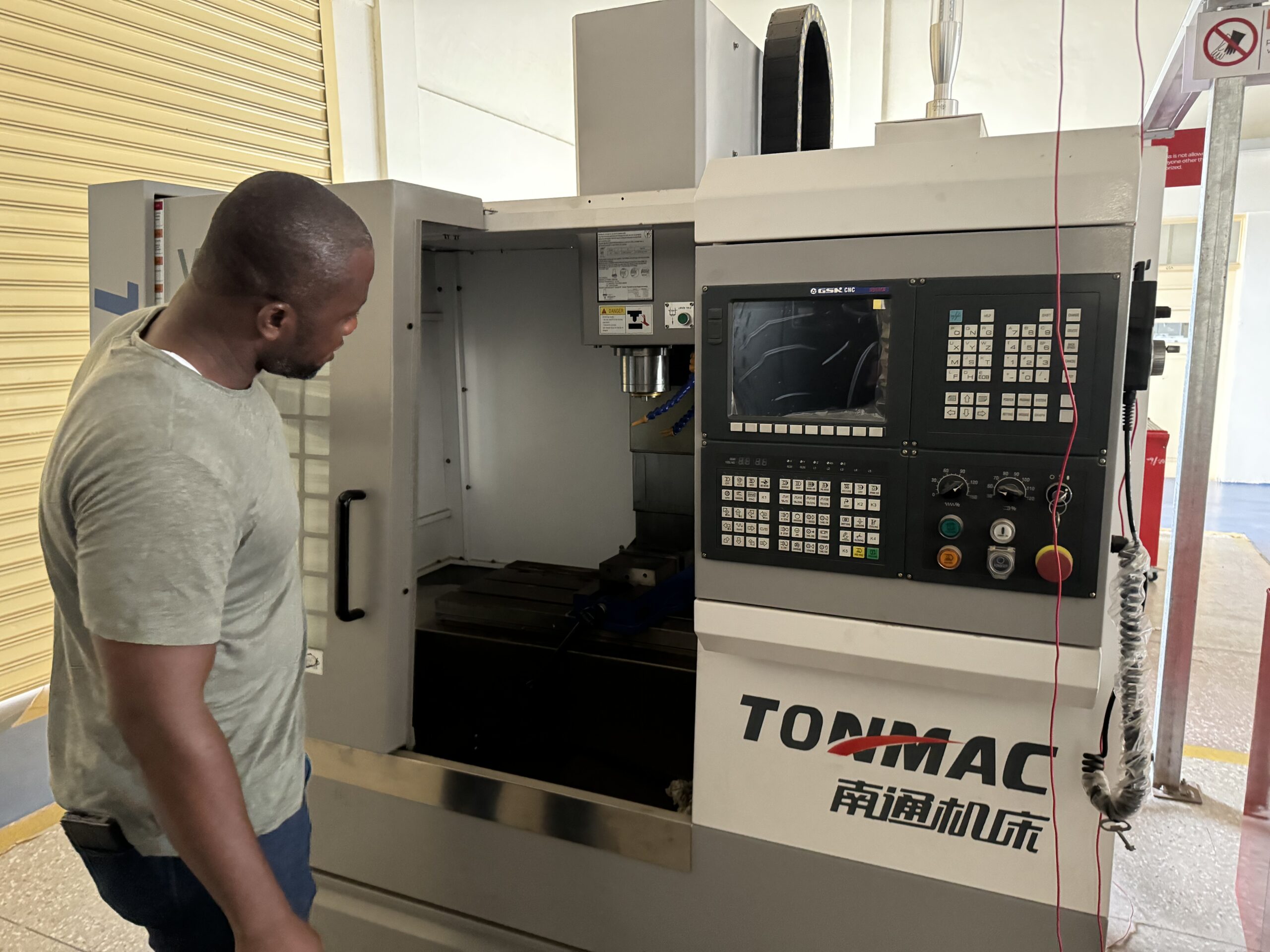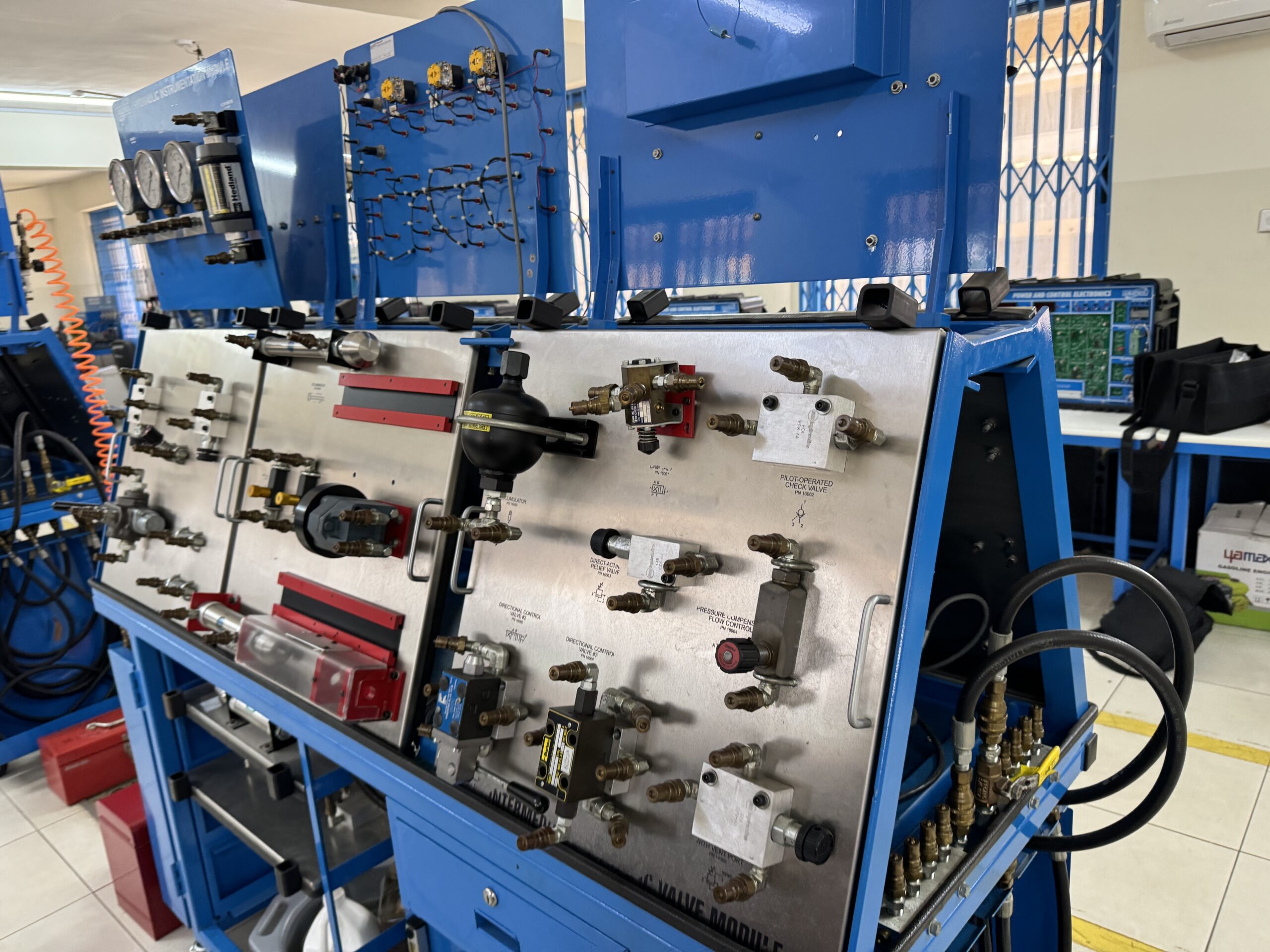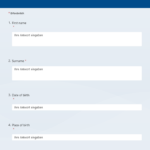Explore D_QaF for HND’s
Digital Qualification for Higher National Diploma’s
We offer intensive German courses that prepare you for the B1 certificate – a prerequisite for entry to Germany. You will then receive excellent training in the field of machining or automation for three months in Germany. During this time, we will network you with your future employer and prepare you for the vocational qualification according to German standards. We will support you throughout the entire application process and in the first few weeks of your new job. We will also help you with integration and life in Germany.



Procedure
German lessons required
You receive intensive German courses from us, that will bring you up to level B1-Certificate (necessary for entry into Germany).
3 Months training
You will receive excellent training in the field of machining or automation for 3 months in Germany. During this period we will connect you to your future employer. Our aim is to prepare you for the professional degree in vocational training according to German standards.
Job in Germany
We support you throughout the entire application process and for the first few weeks in your new job.
Life in Germany
We assist you with integration and life in Germany.
Entry and admission requirements
- Certificates or proof of educational qualifications
- qualifications/professional experience
- Curriculum vitae
- first course starts 15.07.! Application shall be done till 05.07. to ensure your registration is taken into consideration.

What costs are involved for me
The program fee for the top-up-courses for Higher National Diploma / Bachelor graduates in Mechanical Engineering and Electric/Electronical Engineering is as follows:
Application fee: 50,00 €
Language course till B1 (3x 210 €): 630,00 €
Program fee for 3-months top-up course at AWA in Germany (3x 495 €): 1.485,00 €
Cost of living allowances in Germany for 3 months (estimated* amount as of today: 3x 947€): 2.841,00 €
Total 5.006,00 €
The application fee of 50,00€ has to be paid at ATU accounts office before the Application form will be send!
The payment for the language course must be made 7 days prior to the start of the next language course. In case a participant does not pass a language level test and needs to repeat parts of the language training, the cost for re-taking the course is 100€.
To receive a visa for Germany, a German language certificate for level B1 is required. The language test takes place at the Goethe Institut and payment needs to be done directly to the Goethe Institut. The price for the test is currently 110€. If a student needs to re-take an exam, the same amount applies.
The bank transfer of the amount for Germany (program fee + Cost of living allowances) must be made at the latest two weeks before application for the visa. The cost for the visa application has to be borne by the participant and paid directly at the German Embassy.
The first 10 students who complete the German course best, will get free flight tickets to Germany.
Out of the 10 best students, the top 5 program participants* will receive a pre-financial support:
- 2/3 of the cost of living allowances for the 3months in Germany will be catered for by AWA (1.900 EUR). The funding has to be paid back within the first three months of employment.
*Evaluation in an Assessment Center, performance in Language level test for B1 will be included.
*the cost of living allowances per month is defined by German authorities and is based on current standards of living. The amount changes every year, i.e. to adapt to inflation. Thus, the stated amount here is the current official amount.
What is included in the cost of living allowances
Participants have to pay the amount for cost of living allowances on a treasury account in Germany from our partner DCG Halle gGmbH. The amount of 947€ per month will be used to pay in the name of the student for:
- registration/deregistration formalities, bank charges, health and liability insurance
- Rent for a shared apartment (incl. advance payment for heating, water, electricity, cleaning, etc.), Apartment equipment (furniture, mattress, bed linen, kitchen accessories, etc.)
- Security deposit for foreigners’ office and landlord (will be refunded if not used)
- Residence permit fee
- Airport transfer from Leipzig Airport
After payment of all liabilities, there is a monthly cash payment to the participant of approximately 270-300€ (depending on the cost for the shared apartment).
If the participant gets the admission for Germany but cannot take up the course of study for reasons of his/her own or for reasons of visa, he/she must notify DCG that DCG should pay back the transferred fees to a called bank account. If the German side has already contractually bound the accommodation, a processing fee of € 150,00 and the contractually payable rent will be retained. The return transfer cost of the remaining amount is at the expense of the recipient.
Which documents should I provide before the start of the document processing stage?
Application: For the application into the program, we need the following documents:
- Certificates or proof of educational qualifications already obtained
- qualifications/professional experience
- Curriculum vitae
- motivation letter
Recognition process for Germany: As soon as you have achieved a Goethe certificate for language level A2, the recognition process of your educational certificates can start in Germany. The following documents are necessary:
- Tabular list of completed training courses and employment (if existing: content and duration of employment) in German (curriculum vitae)
- Certified color copy of a proof of identity (passport)
- Certified color copy of the professional or training certificates acquired in Ghana including a list of subjects with a German translation (by publicly appointed or sworn interpreters or translators)
Why pursuing a top-up in Germany for your Higher National Degree or Bachelor in the field of Electrical and Mechanical Engineering
- Highly Renowned Dual Education System: Germany’s dual education system combines theoretical studies at vocational schools with practical training in companies. This ensures that students acquire hands-on experience while gaining academic knowledge, making them highly skilled and job-ready.
- Strong Industry Connections: German vocational education programs have strong ties with various industries. This collaboration ensures that the curriculum is tailored to meet current market needs, and students often have better employment opportunities upon graduation.
- Global Recognition and Reputation: German vocational certificates and qualifications are recognized and respected worldwide. Completing your vocational training in Germany can significantly enhance your resume and open doors to international career opportunities.
- High Employment Rate: Graduates of vocational education programs in Germany enjoy a high employment rate. The practical skills and real-world experience gained during training make them highly attractive to employers, often leading to immediate job offers.
- Pathway to Further Education: Completing a vocational education can also serve as a stepping stone for further academic pursuits. Many vocational graduates go on to pursue advanced technical qualifications or even higher education degrees, thereby broadening their career prospects.
The German vocational education system is an excellent choice for individuals seeking a robust and practical education route.
Why coming to Germany
- Around 100 million people speak German as their native language, making German to one of the mostly spoken language in Europe. Because of the stable economic growth and especially through the increasing activities of German companies abroad, the German language is gaining even more importance in international markets.
- German companies have a high degree of internationality and are represented in almost all countries.
- The cost of living in Germany during the top-up program (approx. EUR 945 / month) is low compared to other Western European countries. Thereby, it needs to be differentiated between big and smaller cities. For example, the cost of rent is relatively low in smaller cities, but the quality of housing has a good standard
- In international comparison the German health care system is very good. Each student in Germany is obligated to have a health insurance. This means, every employee has access to the health care system.
- Germany has a very complex and interesting history. There are many historic centres with century-old buildings. Numerous of them have been restored. Public buildings like churches can be visited mostly free of charge. There are various museums and cultural events throughout the year.
- As non-EU citizen employees receive a resident permit for the Schengen area. Through this it is possible to travel around all EU countries that belong to the Schengen area without applying for another visa.
Application Form
The first intake starts 15.07. ! Application shall be done till 05.07. to ensure your registration is taken into consideration.

„Die Wirtschaft ruft und wird von uns gehört“
– Hans-Reiner Kasel Gründer des -AWA- e.V.